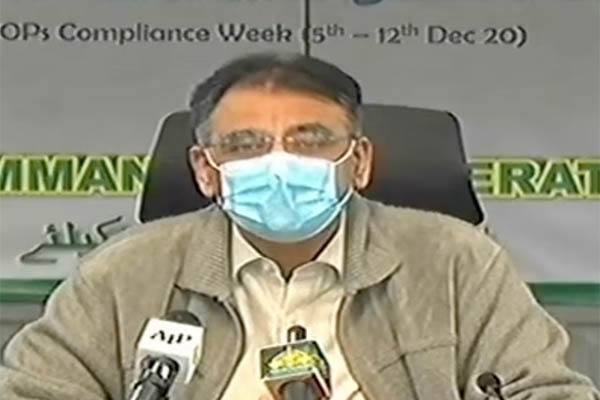
Planning Minister Asad Umar. Youtube
Apart from exempted sectors, all businesses and shops have been directed to remain shut as part of the ‘Stay Home, Stay Safe’ campaign for Eidul Fitr
The National Command and Operation Center (NCOC) on Tuesday announced it was forming special monitoring teams at the federal, provincial, and district levels to ensure the enforcement of coronavirus standard operating procedures (SOPs) during the Eidul Fitr break from May 8-16.
According to a statement, the government has directed all businesses and shops to remain closed next week as part of its “Stay Home, Stay Safe” campaign. Grocery shops, bakeries, and sweet shops would be allowed to stay open every day till 6 p.m., while tandoors and dairies would be allowed to remain open 24/7. Restaurants would also be allowed to stay open 24/7, but would only be able to offer takeaway or delivery services—both indoor and outdoor dining would remain banned over the break.
Other exempted sectors include e-commerce (deliveries of packages); utility services (electricity, natural gas, internet, cellular services, telecommunications); and media groups.
The NCOC had, last week, already announced that all tourist spots—whether formal or informal—would remain shut from May 8-16, adding that public parks, shopping malls, and hotels would likewise remain shuttered. “Travel nodes leading to tourist spots [would also be] closed; focus on Murree, Galiyat, Swat-Kalam, Sea View/beaches and the Northern Areas,” it added.
SOP compliance
Separately, Planning Minister Asad Umar, who also heads the NCOC, announced on Twitter that there had been a “significant” improvement in SOP compliance among the public following the implementation of “stronger enforcement measures, including military deployment.” Noting that the national average compliance rate had increased from 34 percent on April 25 to 68 percent on May 3, he urged citizens to avoid complacency.
“Need to sustain and build on this compliance level specially till Eid,” he added.
According to data shared by Umar, the maximum compliance with SOPs has been monitored in Islamabad, where it averages to 88 percent. In second place is Pakistan-administered Kashmir with 82 percent compliance; Punjab with 69 percent; Gilgit-Baltistan with 67 percent; Khyber-Pakhtunkhwa with 66 percent; Balochistan with 63 percent; with Sindh trailing at 45 percent.
